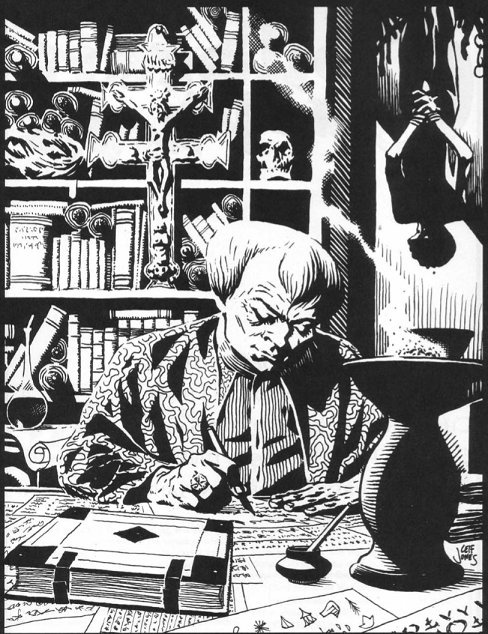Main Page: Difference between revisions
| Line 270: | Line 270: | ||
== <span style="color:#000000;">'''[[Missives: In-Game]]''' == | == <span style="color:#000000;">'''[[Missives: In-Game]]''' == | ||
== <span style="color:#000000;">'''[[Mythology]]'''== | |||
== <span style="color:#000000;">'''[[Missives: Out-of-Game]]''' == | == <span style="color:#000000;">'''[[Missives: Out-of-Game]]''' == | ||
Revision as of 11:29, 23 July 2016
Current Timelines
Brenda, Hayley, Jason & Kyle (February - 2033) / Jamie & Morgan (January 2043) / Brian & Bruce (May 28, 2042) / Kate (July 2029) / Keith/Brian (November 1997)/Nathan-Dee (February 2013)
Quote
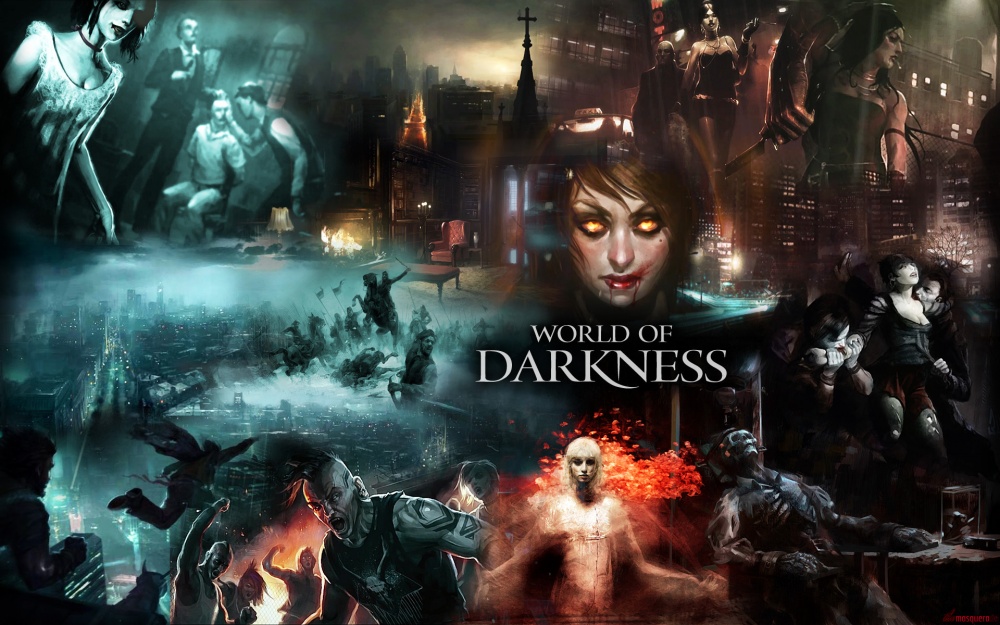
"What horror have the Methuselahs wrought? What grotesque affairs of terror and destruction have they birthed upon this planet? Their cruelty and depravity are legendary, and none can match them for atrocities - and then there is the Black Hand."
"Defender of right, servant of the clan sires and instrument of justice, the Hand plays a central role in the World of Darkness. Far more than the assassins of the Sabbat, the Hand plays its part with all the considerable skill an ancient society can muster."
Dedication: To All the Lost Comrades of our Nocturnal Roleplaying
"As darkness enfolds this aged flesh long ago grown cold, the regrets come. Regrets. To never see the sun or feel its warmth long night after darkened night through an eternity. We alone among all Earth’s creatures know what longing is, for we have given up God’s rest. We yearn for a single spark to pierce the gloom that descends upon us as we hide our faces away from each new dawn, night after shrouded night."
"What do the carping anarchs know of longing? Of loss? Of oppression? We are oppressed by time itself, by the sadistic jest that is unlife eternal, lived for centuries. Immortality is not a blessing. It is the most monstrous of burdens. Of all the issue of God, none but we precious few know the pain that comes with centuries -- the weight of responsibility, the cumber of authority, the yoke that is power. And yet to yield up a morsel of it is to incur utter and total humiliation. We will not step aside. We will not degrade ourselves to give up control or share power with the young. Let all the harrows of hell come to our door seeking what we have built in many lifetimes of toil. I will drag them all back down to the land of shades before I surrender a blot of pride."
-- Elysium, the Elder Wars (VTM -- 1994).
Arcana
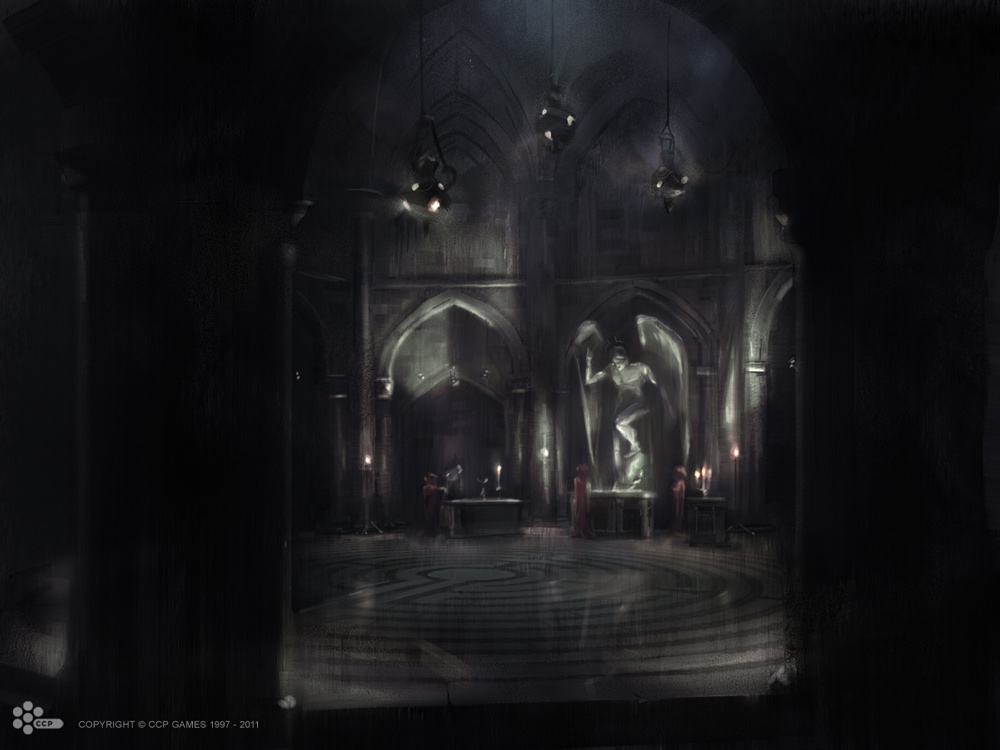
Quote: The face was no longer bone, but animal - the face of a white wolf. "I forbid you nothing. Nothing," uttered the awful face. "You may go anywhere - you may open any door. But, little bird, remember you must be prepared to accept whatever you find." The long jaws spread in a smile filled with teeth. - Peter Straub, Shadowland
- -- Hedge Magic
- -- Infernal Sorcery (Paths & Rituals)
- -- Koldunic Sorcery (Paths & Rituals)
- -- Necromancy (Paths & Rituals)
- -- Setite Sorcery (Paths & Rituals)
- -- Thaumaturgy (Paths & Rituals)
- -- Minor Magical Traditions
- -- Blood Magic Research (All)
- -- Ritual Learning Times (All)
Art of Vampire
- -- Concept Art: Firearms -- Artistic Representations of Jason Maier's Firearms Manufacturing
- -- Futuristic Vehicles
- -- The Dark Sight Collection -- The works found within reflect the world as seen through the eyes of an Abyss Mystic.
Articles
There are currently no articles, apparently Jamie deleted his article on Blood Magic. -- "The Magister 23:50, 25 October 2015 (MDT)"
New articles taken from Kismet's World of Darkness Page
Misconceptions: Player thought conventions that inhibit successful game play in a VtM environment
Bestiary
Quote: "Here's the devil-and-more to pay." - Miguel de Cervantes, Don Quixote de la Mancha
- -- Angelus Lacrimarum
- -- Beasts
- -- Cults
- -- Demons
- -- Divine Host
- -- Doppelgänger
- -- Fae
- -- Familiars
- -- Fomori
- -- Gallû
- -- Ghosts
- -- Gods
- -- Gypsies
- -- Hunters
- -- Infernalists
- -- Kuei-jin
- -- Mafia
- -- Mummies
- -- Oneiroi
- -- Plasmics -- Elementals of the Underworld.
- -- Revenants
- -- Secret Societies
- -- Strotires
- -- The Changing Breeds
- -- Vampiric Proteges (ghouls)
- -- Wizards & Witches
Blogs
- -- Brenda's Website stuff
- -- Brian's Session Notes
- -- Jamie's Notes
- -- Jasons' Journal
- -- Lord Blake's Personal Journal
- -- Mina's Story
- -- Torsten's Blog
- -- When a Storyteller Fails (Bruce's musings of recent storytelling experiences -- open to all to read, but not necessarily for commentary.)
Character Quotes
- -- "Here's my chain, act natural." -Bruce in character as Tiberius in London - 2016 C.E.
- -- "Harden this shaft, please" - Yan to Yakav in London - 2016
- -- "See, it's harder to use him as an ass-puppet than it looks!" - Bruce to Yan in a London graveyard - 2016
- -- "At least I'm not Aspen Barbie!" - Jamie's comment on a dream, 2022.
- -- "If I stand behind you, all I'm going to look like is the back end of the front end of your ass!" - Brian, to Jacob Schumpeter, would be Prince of Ottawa City. November, 2022
- -- "Vampire blood is like deep-fried Twinkies, its so bad for you, but it tastes so good." -- Jason on the blood of other vampires -- September of 2031 {Rio de Janeiro}
- -- "That's what us in the business call... ' bad. '" -- Brian, on the failure to recall one's own gratuitous display of obscene power. -- January 3, 2032, Beirut.
Character Traits
Quote: "One must not always think so much about what one should do, but rather what one should be. Our works do not ennoble us; but we must ennoble our works." - Meister Eckhart, Work and Being
- -- Abilities
- -- Archetypes
- -- Attributes
- -- Backgrounds
- -- Character Creation
- -- Derangements
- -- Disciplines
- -- Experience
- -- Generation Chart
- -- Linguistics and languages (errata)
- -- Maturation Points
- -- Merits & Flaws
- -- Specialties (errata)
- -- Remaining Awake (errata)
- -- The Roads
Discussions
Downtime
Geography

Quote: "The world is a dangerous place to live; not because of the people who are evil, but because of the people who don't do anything about it." - Albert Einstein
One World of Darkness
- -- Africa
- -- The Americas
- -- Asia
- -- Australia
- -- Europe
- -- Indonesia
- -- Middle East
- -- Pacifica
Lands of Darkness
- -- Brazil
- -- Caliphate of Daʿesh -- Islamic State of Iraq, Syria and the Levant
- -- England
- -- La République du Québec
Cities of Darkness
- -- Alt-1920s New Orleans -- The setting for our Jazz Era vampire game.
- -- Berlin -- The Grey City
- -- Boston -- The Hub (Federated American States)
- -- Cairo -- The City of a Thousand Minarets
- -- Chicago -- The Windy City (Federated American States)
- -- Leeds -- Capital of the North {England}
- -- London -- English Capital {The Old Smoke}
- -- Melbourne -- City of Chromatic Dissolution
- -- Naples -- Partenope
- -- New Orleans -- The Big Easy
- -- New York City -- The Big Apple (Federated American States)
- -- Paris -- The City of Lights
- -- Quebec City -- The Once and Forever Capital
- -- St. Louis -- Rome of the West (Capital of the Missouri Free State)
- -- York {England}
Noteworthy Locations
Quote: What powerful but unrecorded race, Once dwelt in that annihilated place. — Horace Smith, “Ozymandias”
Vampire players have always enjoyed the sense of completeness reflected in the World of Darkness — the idea that, as wheels turn within wheels, something they do in their home domain might have repercussions as far away as Venice, Mexico City, or even in the Underworld home of the True Black Hand. The setting truly is a world of darkness, with clans, sects, and mysterious groups and individuals plying their private agendas under moonlit skies. Even when a coterie solved a mystery, something else was always out there, hungrier and bigger than they; that idea is one of the horror elements that still characterizes the world of the Kindred and the more inscrutable things with which they share the darkness. Here, then, are several notable locations of particular significance to the Race of Caine.
- -- The Cathedral of Flesh -- Eastern Europe (Specific Location Unknown)
- -- Hunedoara Castle -- Transylvania, Romania
- -- The Vampire Club -- San Francisco, California
- -- Catedral da Sé -- São Paulo, Brazil
- -- Red Sisters Midnight -- Location Varies
- -- Kaymakli -- Cappadocia, Turkey
- -- Highgate Cemetery -- London, England
- -- Palacio de Lecumberri -- Mexico City, Mexico
- -- Gaslamp -- San Diego, California
- -- Lodin’s Boardroom -- Chicago, United States
- -- The Pyre of Moloch -- Tunisia, Northern Africa
- -- The Tomb of the Patriarch -- Istanbul, Turkey
- -- The Succubus Club -- location varies
- -- Prime Chantry -- Vienna, Austria
- -- Alamut -- near Tehran, Iran
- -- l'Ossuaire Municipal de Paris -- The Catacombs of Paris -- Paris, France
- -- Dr. Netchurch’s Laboratory -- Lowell, Massachussetts
- -- Utgård -- Vesterøy, Norway
- -- The Abbey of the Sacred Crown -- Hampshire, England
- -- Gamla Stan -- Stockholm, Sweden
- -- Poveglia -- Venice, Italy
- -- Celestial Park -- Dallas, Texas
- -- Varosha -- Famagusta, Cypress
- -- The Chase Vault -- Oistins, Barbados
- -- Block Arcade -- Melbourne, Australia
- -- The Second City -- Location Unknown
Alternate Realities
- -- Ancient Enoch
- -- Limbo
- -- Pandæmonium
- -- The Abyss
- -- The Maya Realms - The World of Dreams
- -- The Reach -- Paradox Realm of Time
- -- The Underworld - The Lands of the Restless Dead
- -- Xibalba --
History
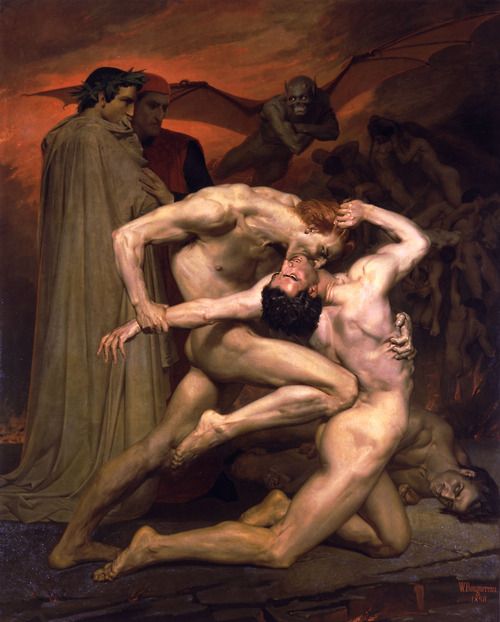
Quote: "History is written by the victors." - Winston Churchill
- -- Current Stories
- -- Downtime
- -- Iteration I - Original Timeline
- -- Iteration IV - Current Timeline
- -- Past Stories
- -- Personal Histories
- -- December - 2011
- -- July - 2012
- -- September - 2012
Ingame Newspapers
Lexicon
Missives: In-Game
Mythology
Missives: Out-of-Game
Night Gallery
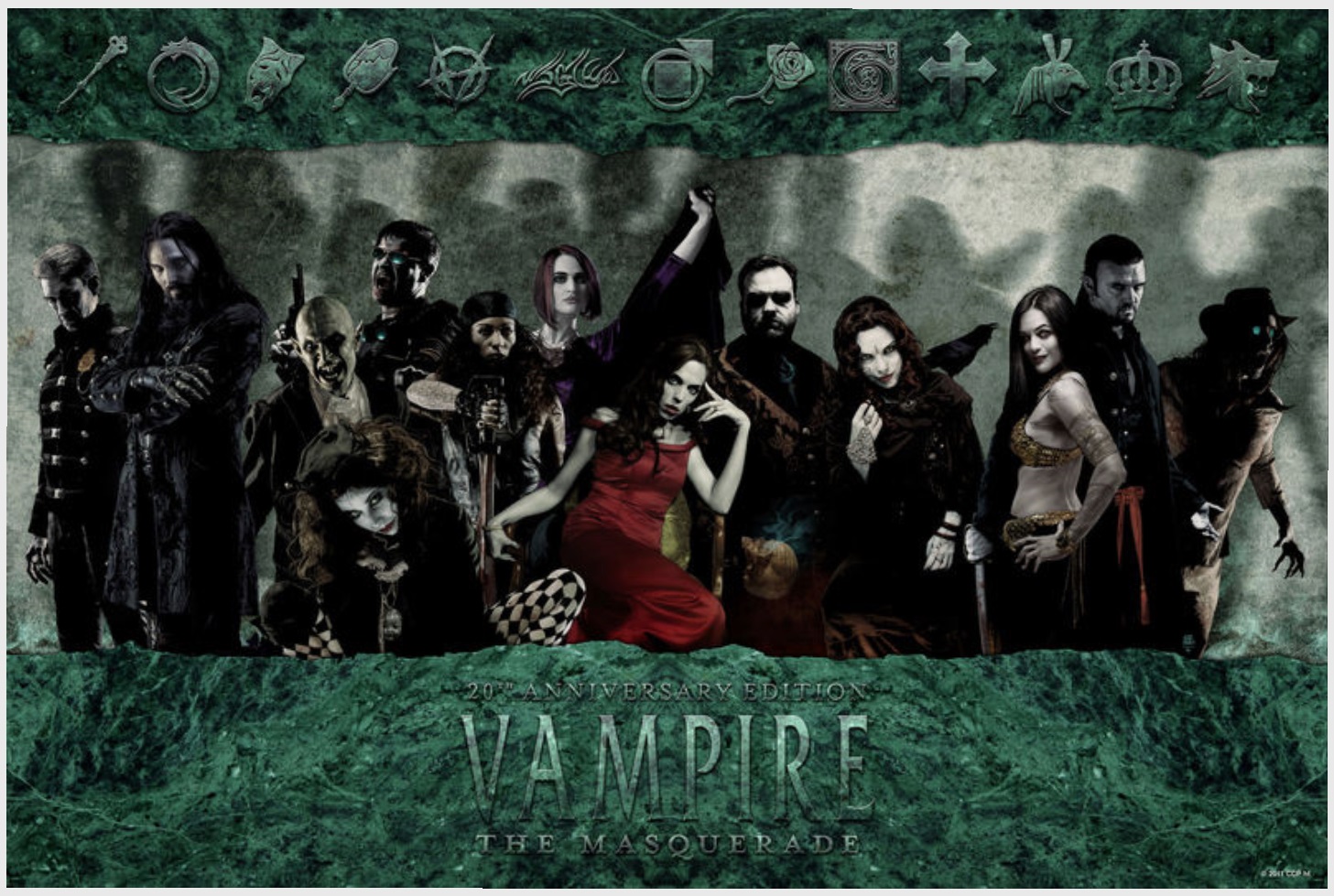
Quote: "All the world's a stage, And all the men and women merely players. They have their exits and their entrances; And one man in his time plays many parts." - William Shakespeare, As You Like It
- -- Antediluvians
- -- Arrayed Alphabetically
- -- Bloodlines
- -- Arrayed by Clan
- -- Arrayed by Sect
- -- Character Creation
- -- Dead Vampires
- -- Methuselah
- -- Mortals and Others
- -- Player Characters
- -- Vampire Genealogy
Player Schedules
- -- Brenda's Schedule
- -- Brian's Schedule
- -- Bruce's Schedule
- -- Jamie's Schedule
- -- Jason's Schedule
- -- Morgan's Schedule
Politics
Quote: "There's a difference between us. You think the people of this country exist to provide you with position. I think your position exists to provide those people with freedom." - William Wallace
- -- Prestation
- -- The Jyhad
Rules
Quote: "Mortals thought they were fighting their own wars, but it is for us that they spilt their blood." -- The Book of Nod
Actions
Over the course of a game, a character will do many things. Some of these tasks are considered actions, while others aren’t. Actions are anything that might produce an interesting outcome to the direction the story takes. Trying to use a Discipline on the Prince, hiding in the shadows to ambush a rival pack, scaling a cemetery wall, attempting to forge a damning note from the Toreador Primogen, rending one’s claws through the guts of a frenzied Tzimisce — these are all examples of actions. One action typically takes one turn to complete.
In most cases, speaking and conversations aren’t considered actions. Although interesting developments may certainly arise from things the Kindred say to one another or to the other residents of the World of Darkness, talking is typically free in terms of game mechanics. The Storyteller may rule otherwise, such as whether a vampire manages to scream out the location where the Methuselah has the ghouls trapped before the sunlight burns him to ash, but for the most part, the game places as few limitations as possible on communication among players and characters.
It’s easy enough to attempt an action — just tell the Storyteller what your character’s trying to do and how she plans to go about it. Most actions — crossing the street or loading a pistol, for instance — are easy enough to be considered automatically successful. However, if you’re trying to cross a four-lane highway full of speeding trucks, or trying to reload while you’re hanging from a fire escape by one hand, there’s a chance you might fail. So when there’s reasonable doubt whether an action will succeed or not, you may have to roll dice to determine the results.
If you need only one success to accomplish an action, the action in question is called a simple action. Actions that require more successes or longer periods of time to complete are called extended actions.
Automatic Success
Sometimes rolling dice is unnecessary, particularly when the task is a relatively simple one for a character, or when there’s not much at dramatic stake to necessitate determining how well a character succeeds or fails. Remember, anything that streamlines play and reduces distractions is a good thing. Vampire employs a simple system for automatic successes, allowing you to skip rolling for tasks that your character would find frankly mundane.
Simply put, if the number of dice in your dice pool is equal to or greater than the task’s difficulty, your character automatically succeeds. No dice roll is necessary. Mind you, this does not work for all tasks, and never works in combat or other stressful situations. Furthermore, an automatic success is considered marginal, just as if you’d gotten only one success on the roll. If quality is an issue — the dramatic necessity mentioned earlier — you might want to roll the dice pool anyway to try for more successes (although you still risk potential failure). But for simple and often-repeated actions, this system works just fine.
There’s another way to get an automatic success on a roll: Simply spend a Willpower point. You can do this only once per turn, and since you have a limited supply of Willpower you can’t do this too often, but it can certainly help when you’re under pressure to succeed.
Reflexive Actions
Reflexive Actions In some cases, taking a particular significant action doesn’t actually take any appreciable amount of time. These actions often come as a result of or are triggered by other actions. In game terms, these are called reflexive actions, and performing one may break the normal sequence of play and action resolution. A reflexive action doesn’t require “taking an action” as described above to accomplish. Your character can perform one whenever the opportunity arises, and may also take his normal action, without any penalty.
For instance, spending a blood point to increase an Attribute is considered to take less than a second of game time — no dice are rolled, and your character can do this while doing something else. Soaking — withstanding the damage from an attack — is likewise a reflexive action. Making a Humanity roll is a reflexive action, though it may well lead to other, standard actions.
In most cases, the only prerequisite for performing a reflexive action is that the character be conscious (or otherwise capable of choosing to take the action, in the case of dream sequences or other deviations from consciousness that still allow choice) in order to choose to do so. Unless otherwise specified, a character may perform any number of reflexive actions, and they don’t get in the way of anything else she may want to do in a turn.
Multiple Actions
Occasionally, a player will want her character to perform more than one action in a turn. For example, a character may be trying to search through a notebook to find a password while creeping stealthily through a hallway, or might be trying to sidestep an incoming attack while firing a pistol into her assailant’s gut. In such situations, the player can attempt actions normally, though all actions become more difficult as the character’s attention is split among them.
The player declares the total number of actions he wishes his character to attempt and determines which of those dice pools is the smallest. He may then allocate that number dice among the actions as he sees fit.
Example: You want your character to hang a sharp right turn in a stolen taxi cab while simultaneously screaming at the surprised cabbie in the passenger seat to calm the hell down or you’ll tear him in half. This is a Dexterity + Drive roll (for which your character has seven dice) and a Charisma + Intimidation roll (for which your character has five dice). Five dice is the smaller dice pool, and you may thus divide five dice among the number of actions you want to take. That is, you may allocate these five dice as you see fit between the driving maneuver and intimidating the cabbie.
At the Storyteller’s discretion, certain action combinations that are wildly disparate may incur a difficulty increase (see below) on top of the split dice pool limitations. Composing a stirring poem while showering an enemy with a hail of bullets is a task not lightly undertaken. As well, at the Storyteller’s discretion, splitting dice pools to a certain degree may well just be plain impossible.
Vampires with the Discipline of Celerity (p. 142) may take multiple actions without subtracting dice from their dice pools. These extra actions may not themselves be divided into multiple actions.
Extended Actions
The Difficulty in Rolling Dice
There’s no point in rolling dice unless you know what results you’re looking for. Whenever you try to perform an action, the Storyteller will decide on an appropriate difficulty number and tell you her decision. A difficulty is always a number between 2 and 10 (but generally between 3 and 9). Each time you score that number or higher on one of your dice, you’re considered to have gained a success. For example, if an action’s difficulty is a 6 and you roll a 3, 3, 8, 7 and 10, then you’ve scored three successes. The more you get, the better you do. You need only one success to perform most actions successfully, but that’s considered a marginal success. If you score three or more, you succeed completely. Also, a result of a 10 is always a success, no matter the difficulty number.
The following charts should give you a good idea of how to combine difficulties and degrees of success.
- Difficulties
- Three Trivial -- (scanning a small crowd for a familiar face)
- Four Easy -- (following a trail of blood)
- Five Straightforward -- (seducing some one who’s already “in the mood”)
- Six Standard -- (firing a loaded gun at a stationary target)
- Seven Challenging -- (locating where those agonized whispers are coming from)
- Eight Difficult -- (convincing a cop that this isn’t your cocaine)
- Nine Extremely difficult -- (walking a tightrope fifty stories above the ground)
Naturally, the lower the difficulty, the easier it is to score successes, and vice versa. Six is the default difficulty, indicating actions neither exceptionally tricky nor exceptionally easy to accomplish. If the Storyteller or rulebook ever calls for you to make a roll, but doesn’t give you a specific difficulty number, assume the task is difficulty 6.
- Degrees of Success
- One Success Marginal -- (getting a broken refrigerator to keep running until the repairman arrives)
- Two Successes Moderate -- (making a handicraft that’s ugly but useful)
- Three Complete -- (fixing something so that it’s good as new)
- Four Exceptional -- (increasing your car’s efficiency in the process of repairing it)
- Five or More Phenomenal -- (creating a masterwork)
The Storyteller is the final authority on how difficult attempted actions are — if the task seems impossible, he’ll make the difficulty appropriately high, while if the task seems routinely easy, the difficulty will be low (if the Storyteller decides you even have to roll at all). A difficulty 3 task is so easy that it probably doesn’t merit a die roll, but a fluke failure or extraordinary success might sometimes make it worth the chance.
At difficulty 10, the results curve becomes very anomalous – indeed, there are a few dice pools for which the likelihood of botching actually increases over having a smaller (and thus theoretically “worse”) dice pool.
Failing a Roll
If you score no successes on a roll, your character fails his attempted action: He misses his punch. The file is encrypted too well. The Prince doesn’t believe her alibi. Failure, while usually disappointing, is not so catastrophic as a botch (below).
Example: Your character is attempting to eavesdrop on the greasy-looking guy with a bag of pills who’s talking to the blonde in the corner of the bar, and is trying to look nonchalant by the pool table. The Storyteller tells you to roll your character’s Wits + Subterfuge (difficulty 7). You roll and the dice turn up 2, 5, 6, 6, 4, 3 — no successes. The Storyteller rules that the greasy guy notices you making an awkward show of pretending to chalk your cue and stops talking to the girl, staring your character down instead. He doesn’t draw a weapon or bolt for the back door, but whatever this deal is isn’t going any further.....
Storytellers, bear in mind that failure is simply that: failure. All it means is that the attempt didn’t produce the desired result. Judge the narrative accordingly, but a failure probably doesn’t in itself result in any harm to the character unless the circumstances would dictate such. A failed attempt to jump the gap between two buildings probably doesn’t result in a breakneck plummet, but perhaps the character lands clumsily on a fire escape below the intended rooftop, or maybe she knocks the wind out of herself and is desperately hanging onto the ledge.
Botching a Roll
Bad luck can ruin anything. One more basic of a roll is a “botch.” Whenever one of the dice comes up as a 1, it cancels out a success. Completely. Take the die showing 1 and one of the dice showing a success and set them aside. In this manner, an otherwise successful action may be reduced to failure.
Occasionally, truly bad fortune strikes. If none of your dice comes up a success, and one or more dice are dice showing 1, the roll is a botch. If you score at least one success, even if that success is canceled out and additional 1s remain, it’s just a simple failure.
A botch is much worse than a normal failure — it’s dramatic misfortune. For instance, rolling a botch when trying to fast-talk the Sheriff might make him think you’d better go see the Prince to explain yourself. Botching a Stealth roll when breaking into an apartment makes so much racket the neighbor calls the police. Botching an Animal Ken roll enrages the animal. Botching an Athletics roll means you gauged the width of the gap between the two buildings incorrectly... and look at all that chain-link fence and razor wire rising up to meet you. The Storyteller decides exactly what goes wrong; a botch may produce a minor inconvenience or might result in wholesale catastrophe.
Of course, some Storytellers may find that botches are cropping up a little too frequently in their chronicles (the laws of probability often warp around dice, as any veteran roleplayer can attest). In that case, it’s the Storyteller’s privilege to give everyone, player and Storyteller character alike, one botch “free” — in other words, the first botched roll of the session doesn’t count. This rule tends to make unlife a little easier on the players — but then again, there’s less chance of their enemies suffering a run of bad luck as well.....
Example: Your character is desperately fleeing from the Archbishop’s most zealous Paladins, and all that’s standing between him and the safety of his haven is a freight elevator that leads up to the service docks of the meatpacking plant. You roll your character’s Stamina + Athletics (difficulty 8), hoping to outpace your pursuers to the elevator and get 9, 1, 1, 8, 1. The 1s outnumber the successes, but because you rolled any successes at all to begin with, the action simply fails. The Storyteller rules that you make it to the elevator — but it’s two floors up.
You dash toward the staircase, but you’re not so lucky as the chase continues. The Stamina + Athletics dice come up 1, 3, 4, 3, 7. This time, not only did a “1” occur, but no successes were scored at all, so the action is a botch. The Storyteller rules that the Sabbat thought you might try to run away like a punk bitch, and backed a forklift into the stairwell, blocking it entirely. No choice but to turn around and face them....
Botching is a place where some creativity on the part of the Storyteller goes a long way. There’s nothing wrong with having a botch signify a dropped gun or stalling out a car in a chase, but a botch might also be an odd fluke that happens at an incongruous time or a butterfly effect that may haunt the chronicle at a later point. Instead of dropping the gun, maybe a botched firearms roll signifies that the gun went off to close to the shooter’s face, blinding or deafening her. Maybe the botched Drive roll suggests that, as the car fishtailed around the corner, the captive Toreador in the back seat made a break for it or the manila envelope full of the incriminating photos fell out the open window. Botches should create a new dramatic twist to the scene in which they occur. They don’t have to be reliable pratfalls.
Automatic Feats
Automatic feats require the character to take an action, but don’t involve a dice pool roll under most circumstances. The following are common automatic feats. Storytellers may decide that other feats are automatic, at their discretion.
- -- Blood Use -- Healing, Augmenting Attributes, etc.
- -- Getting to Your Feet
- -- Movement
- -- Readying a Weapon
- -- Starting a Car
- -- Yielding
Physical Feats
These systems cover actions involving the three Physical Attributes (Strength, Dexterity, and Stamina). These feats typically require a roll. Remember that Celerity, Fortitude, and Potence add dice to Physical Attributes when making many of these rolls.
- -- Carrying Capacity ~ {Strength}
- -- Climbing as an Action ~ {Dexterity + Athletics}
- -- Driving ~ {Dexterity/Wits + Drive}
- -- Hunting as an Action ~ {Various Styles}
- -- Intrusion ~ {Dexterity/Perception + Larceny}
- -- Jumping ~ {Strength, or Strength + Athletics for a running jump}
- -- Lifting / Breaking ~ {Strength}
- -- Opening / Closing ~ {Strength}
- -- A Stake Through the Heart
- -- Amaranth
- -- Body Armor
- -- Damage Types
- -- Deterioration
- -- Drugs of the Future World
- -- Electrocution
- -- Final Death
- -- Frenzy & Rötschreck
- -- Movement
- -- Poisons and Drugs
- -- Staking
- -- Strength Chart
- -- Technology
- -- The Blood Oath
- -- Torpor
- -- Faith Rating
- -- Weapons
- -- Willpower
Storyteller Support
“Writing controlled fiction is called “plotting.” Buckling your seatbelt and letting the story take over, however…that is called “storytelling.” Storytelling is as natural as breathing; plotting is the literary version of artificial respiration.” ― Stephen King, Salem's Lot
Sunrise / Sunset
- -- Sunrisesunset.com [1]
International Time Zones
Game Years
20th Century War Machines
- -- Roden Models [[2]] - Great scale images of war machines.
The Modern Traditions
The First Tradition: The Masquerade
Thou shall not reveal thy nature to those not of the Blood. Doing so shall renounce thy claims of Blood.
The Second Tradition: The Domain
Thy domain is thine own concern. All others owe thee respect while in it. None may challenge thy word while in thy domain.
The Third Tradition: The Progeny
Thou shall sire another only with the permission of thine elder. If thou createst another without thine elder's leave, both thee and thy progeny shall be slain.
The Fourth Tradition: The Accounting
Those thou create are thine own childer. Until thy progeny shall be released, thou shall command them in all things. Their sins are thine to endure.
The Fifth Tradition: Hospitality
Honor one another's domain. When thou comest to a foreign city, thou shall present thyself to the one who ruleth there. Without the word of acceptance, thou art nothing.
The Sixth Tradition: Destruction
Thou art forbidden to destroy another of thy kind. The right of destruction belongeth only to thine elder. Only the eldest among thee shall call the blood hunt.
The Medieval Traditions of Caine
- The First Tradition: Covenant
- "Thy blood makes thee my brood, crafted in my image."
- "My curse thine, my salvation thine."
- "I stand before and above thee, as god-regent."
- "I am the way, my Traditions covenant."
- "Renounce me and renounce all hope."
- The Second Tradition: Domain
- "As I am master of Nod, thy domain is thine own concern."
- "Thou art its master, and all will respect this or suffer thy wrath."
- "All will present themselves when entering, and thou shalt protect them in turn."
- "By right, thou art allowed to hunt within the bounds of thy domain, its blood thine own."
- "Accept its responsibilities, minister thy domain and pay others the same respect accorded you."
- The Third Tradition: Progeny
- "Thou shalt only sire another with the permission of thine elder."
- "To create is the providence of those closest to me, for they shall be accountable."
- "Break this, and both thee and thy progeny shall be slain."
- The Fourth Tradition: Accounting
- "Those thou create are thine own blood until released from thy charge."
- "Until that moment, their sins, their blood and their punishments are thine."
- The Fifth Tradition: Destruction
- "Forbidden art thou to spill the blood of another of thy kind who is elder."
- "This right belongs only to the closest to me and none other."
- "It is forbidden for those of weaker blood to rise against their elders."
- The Sixth Tradition: Silence
- "Never shalt thou reveal thy true nature to those not of the blood."
- "Doing so shall renounce thy claims to my covenant."
Television Shows
http://www.penny-dreadful.com/ --{New & Quite Good}-- http://www.sho.com/sho/penny-dreadful/home -- {The World of Darkness as it Should be.}
http://newepisodes.me/watch-dracula-online-free/58928/about -- {Dracula 2013} -- {Victorian Age Vampire at its best.}
https://en.wikipedia.org/wiki/Moonlight_%28TV_series%29 {Moonlight - a TV show about modern vampires in Los Angeles circa 2007} -- Check it out: http://newepisodes.me/watch-moonlight-online-free/5690/about
http://www.bbcamerica.com/orphan-black/ {A Fairly good look at Doppelgangers}
http://en.wikipedia.org/wiki/Hemlock_Grove_%28TV_series%29 {Slow - but very World of Darkness}
http://www.fxnetworks.com/thestrain/ {A Grade B horror - action thriller about vampires the way the medieval mind probably saw them -- Vicissitude at its best.}
Vampire Music
http://rock.rapgenius.com/albums/The-clash/London-calling {During the First Edition, The Clash were a very popular sound by which to play Vampire.}
Vampire Websites
http://enoch.wikidot.com/start
http://www.vtm.kismetrose.com/VampireSite.html
http://mypage.iu.edu/~adashiel/wod/
https://thealbanyfiles.obsidianportal.com/
http://reference.l2fury.com/index.php?title=Main_Page
http://theonyxpath.com/ {Highly Recommended}
http://www.white-wolf.com/ {Useful}
http://whitewolf.wikia.com/wiki/Main_Page {Useful}
http://rp.thesubnet.com/ {This site contains the new 20th Anniversary Edition material}
http://forums.whitewolfarchive.com/default0a8a.html {Forum on all things VTM}
http://www.offkorn.com/blog/vtm-owod-vampiric-npc-listing/
http://www.thesubnet.com/portal/wod/vtm/CreationAbAS.html
http://www.thesubnet.com/portal/wod/vtm20/index.html {5 Stars}
Wiki Documentation
Other Gaming Worlds
- -- Aerondrell: -- AD&D based world of Keith's.
- -- Faerun: -- AD&D homeworld
- -- Ravenloft: The Demiplane of Dread -- AD&D Nightmare Lands
- -- Golarion: Nation of Osirion

